One of the most isolated archipelagos on Earth just got its first five-star hotel
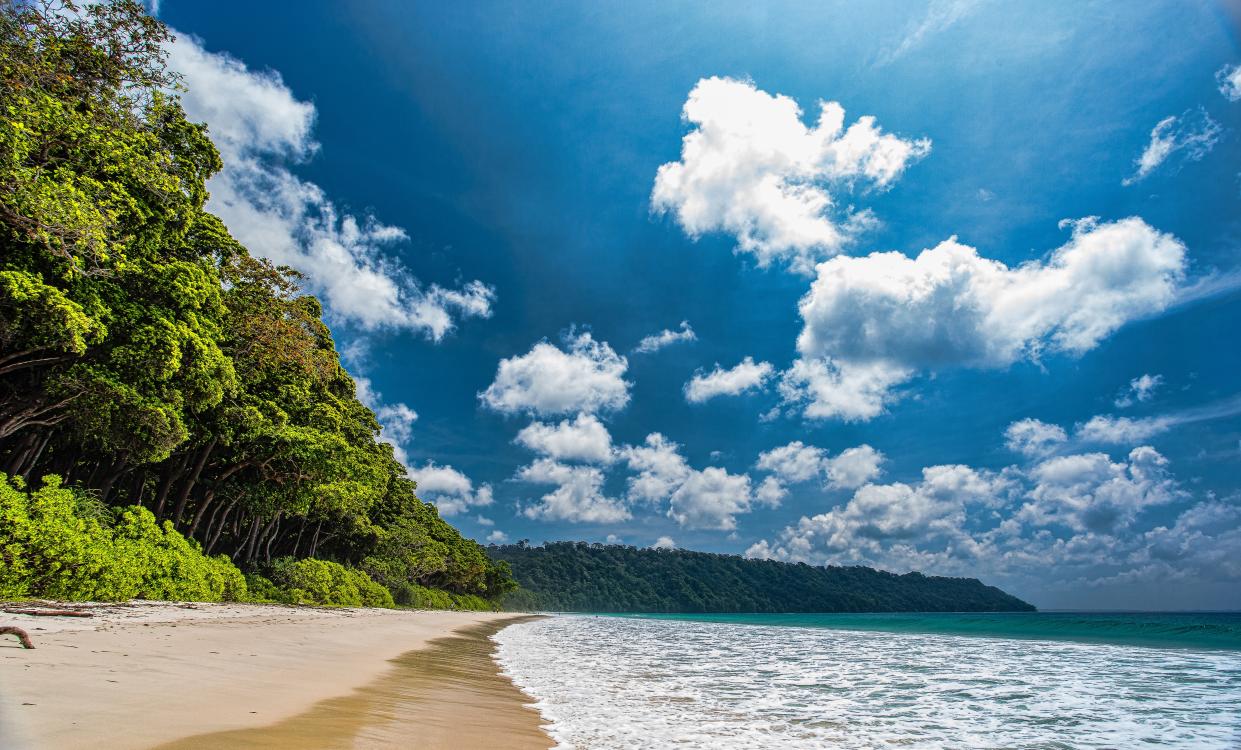
Right. Right. No, right – not left!” I yelled. Too late. Me and Mum – who has the upper body strength of a hamster – let the mangroves swallow our boat. The soft crunch of branches prickled against the silence. We stopped. Then swivelled our arms and twisted our brains, trying to remember how to row the oars backwards. Eventually we made it out of the morass of twigs and glided on, deeper into the watery darkness.
We were kayaking at night in the Andamans – a paint spatter of pristine islands in the middle of the Bay of Bengal. To my right was Sir William Peel Island, just one of the Andamans’ many uninhabited atolls, every inch of soil gobbled by waxy-leafed creepers and mahua trees. To my left another land mass ostentatiously braided with mangrove trees.
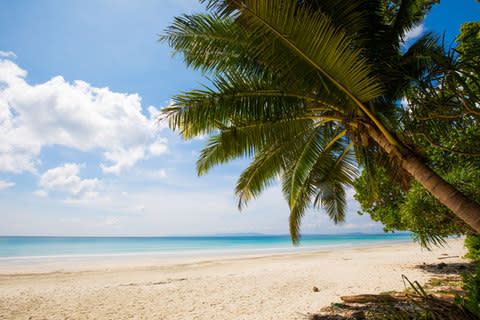
A splosh. “What was that? Are you sure there aren’t saltwater crocodiles,” I rasped. “I’ve never seen any myself,” Ali, the leader of our group of six, boomed back from his own kayak. To distract me, he pointed his torch at the stars, tracing Orion. It was as if the sky had been sprinkled with fairy dust. Perhaps in competition, the water dazzled back with its own phosphorescence; sticking my oar into the deep was like setting off a thousands sparklers beneath the surface.
The Andamans has something of the Maldives about it, but with more to offer for the intrepid traveller – best suited to those who crave adventure in untouched backwaters, as well as the feeling of flour-soft sand between their toes. And with the arrival of a game-changing resort by the Taj hotel group earlier this year – the destination’s first world-class luxury hotel – it looks set to be on the travel radar like never before.
For travellers with stamina for long journeys and a reclusive impulse, the Andamans certainly delivers. Getting to Havelock Island, where the new hotel is located, entailed a two-hour plane from Chennai followed by a two-hour ferry, but from my first glimpse of the Taj Exotica Resort & Spa, Andamans, I knew it had been worth the trip.
The main outfit – a stark oblong building hewn from slatted palmyra wood – has something of the eco-spaceport about it. This is appropriate given that the hotel seems suspended between two worlds – both on the beach and in the thick of the jungle – poking from behind a spikey-trunked curtain of silk cotton trees.
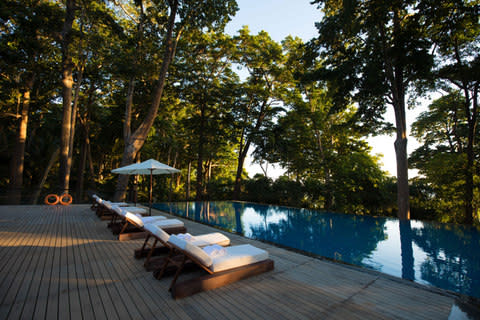
The new Taj hotel is located in the relatively undeveloped south of the island (the north is where the bulk of development remains) and it seems determined to keep the surrounding hinterlands as far as possible intact with a sustainable approach. Some of the resort’s water is collected from rain, and it has installed an on-site biogas outfit, which is non-polluting and emits zero greenhouse gases.
Crucially, the hotel is planting indigenous flora and fruit trees to combat the alarming trend of deforestation elsewhere in the Andamans. The resort itself uses sustainable plantation woods (whereby when a tree is cut down another is planted to replace it). Guests are already sipping on their poolside drinks with bamboo straws, and feasting on vegetables grown in the hotel’s garden.
There is a pristine perfectionism to Taj Exotica; minimalist furnishings made from coconut wood are upholstered with smart canvas colours and soothing greys. Floor-to-ceiling glass walls let the sunlight surge in. And the lobby is forensically symmetrical, down to the decorative pots containing three oversized branches each at either end.
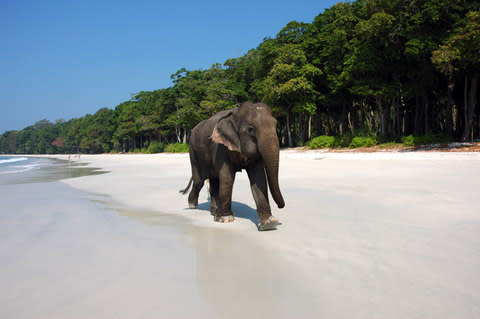
But you never forget you are occupying the gateway to the island’s sprawling southern forest. Trees punch through the floorboards from the gym up to the main pool deck. Literal enactments of “barefoot luxury” are not advisable: to get to their villas, guests must traverse the sandy soil bed, navigating the nodulous buttresses of the wood apple trees.
It is tempting to never leave the hotel. I spent many a morning doing snail-pace laps of the Olympic-sized infinity pool, which juts out towards the sea from a raised wooden deck. From ginger lemonades on the sunbeds that ogle the ocean to snoozing in hammocks that sway in synchrony with the surrounding sugarcane, opportunities to luxuriate in slothful stupor are plentiful.
Some may be disappointed that most villas are quite far back into the forest, and thus do not have sea views. But at least there are no over-water monstrosities that damage the coral as in some other tropical island resorts. And the bedrooms are thoughtfully constructed – on stilts, and with curved thatch roofs, in the style of the traditional homes of the Andaman Islands’ Jarawa tribe.
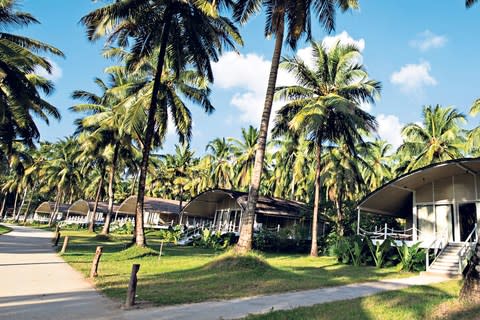
Their overall design defy categorisation though: wholesome white porches almost make you wish you’d packed your cowboy boots. Inside, the butter-smooth, almost-black wood cladding is less rustic shack, more soothing spa resort. Decorative touches are few but impactful, from floor lamps shaped like giant candles to a black four-poster bed knotted with metres of muslin, like a prop for anti-gravity yoga.
In the bathroom, tubs are set under skylights with purpose-built trays to prop up one’s novel (and glass of red); lavatories are furnished with copies of Vogue. But in the bedrooms, it is also clear that hotel still has its work cut out to realise the group’s wider anti-plastics ambitions. Reusable glass water bottles are used instead of disposable plastic ones in the restaurants but not yet in the sleeping quarters. The resort has promised to have ceramic dispensers in the bathrooms, but mine was kitted out with tiny plastic dispensables.
In the two signature restaurants, wave after wave of super-sized seafood and lustrous curries are brought forth on splashy plates crafted by local artisans. The hotel’s Settlers restaurant has distilled traditional local recipes into a multi-course menu served at a communal table. Think Tamil-spiced lobster pepper fry, and Keralan-style grouper fish steamed inside a banana leaf. At beach-side Shoreline, giant mud crabs and Bengali prawns the size of small chickens paddle in spicy, coastal sauces suffused with lemongrass and coconut.
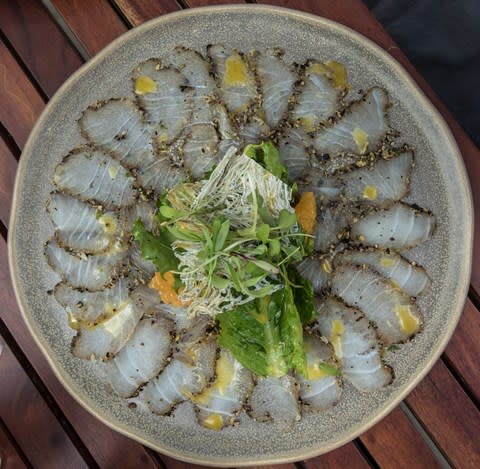
The prospect of spending all day at the hotel may be alluring, but the wilderness beyond demands to be explored. Mum and I traversed surrounding forests – fiercely untouched but not forbidding – with Jocelyn, the hotel’s naturalist. The crackle of creatures across the leaf-scattered forest floor was unnerving at first, but once I realised that these were cute hermit crabs and sunbathing lizards, I soon relaxed enough to enjoy the scenery: soils swirled with flower-shaped fungus; atlas moths as big as bats fluttered above; Neem trees smelled of garlic and musk.
One of the best ways to explore more of the Andamans archipelago from Taj – even if you have just a half-day to spare – is by hiring a boat. We sailed northwards towards John Lawrence Island, past smaller land masses clotted with mangroves and almond trees.
Normally, I’m not good at snorkelling; with my panicked dog-like breathing, and constant need to rise to the surface to spit out saltwater (and my mum, hailing from the landlocked West Midlands, refused to get in at all). But on this occasion I was mesmerised: turtles splashed in the shallows, clownfish scintillated orange and white against the pearly-hued coral, and shoals of dogtooth tuna flashed silver like tinfoil in the sun.
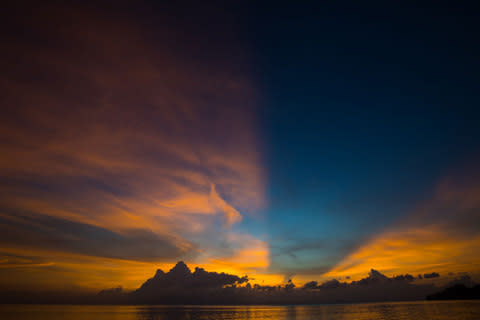
But for all the luxury at the hotel, the Andamans is less polished than the world’s other pockets of paradise. I was bemused that after reeling in a king mackerel bigger than an eight-year-old boy, my hosts on a fishing trip organised by the hotel claimed it for their own dinner, and stuck it in the cooler box rather than setting it back in the water.
Some areas of the Andamans are still no-go because the inhabiting indigenous tribes are “hostile” to visitors. To say things like this are part of the charm is a stretch; to say they’re part of the rugged vibe of the place would be more accurate. Nonetheless, that this sun-kissed world of sketchy health and safety and salty mangrove swamps might just be the world’s most desirable up-and-coming island destination is in little doubt. And the arrival of the archipelago’s first five-star resort will certainly help.
The world's best islands?
Essentials
A seven-night stay at Taj Exotica Resort & Spa, Andamans costs from £3,660pp, B&B, including return flight and some activities, through Scott Dunn (020 8682 5060; scottdunn.com).